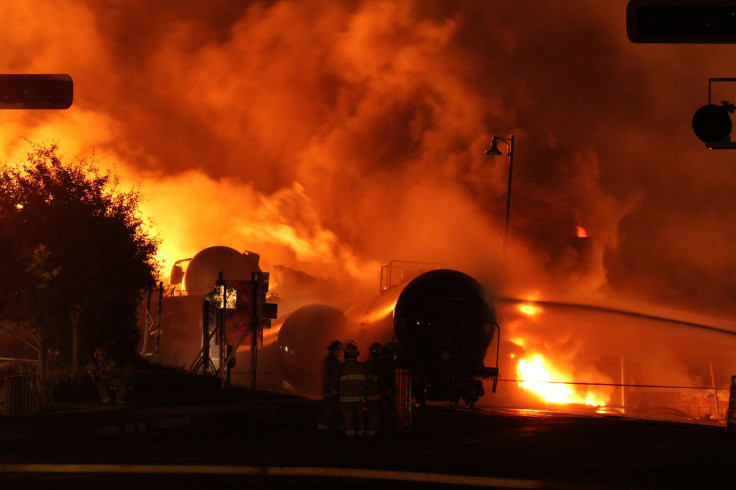Canada Mulls Oil-Train Safety Tax, Wants Rail Industry Accountable For Every Disaster Cleanup

Canada will be introducing legislation calling for the creation of a disaster relief fund, where funds will come from taxes to be imposed on all oil producers.
Canada wanted railways and shippers to hold more of the accountability for every disaster cleanup, following the July 2013 Lac-Mégantic derailment accident of a crude-carrying train in Quebec that claimed 47 people and wiped out the town’s identity. Although the now-bankrupt Montreal, Maine & Atlantic Railway had insurance of C$25 million ($20 million), the costs of the cleanup and reconstruction went way over the figure, forcing federal and provincial governments to pick up the rest of the tab.
Transport Minister Lisa Raitt said on Friday crude shippers will be required to pay 1.65 Canadian dollars ($1.32) per metric tonne of crude oil carried. The government will also be imposing a mandatory minimum insurance coverage levels, depending on the type and volume of carried crude. For companies carrying over 1.5 million metric tonnes of crude per year, the minimum required insurance C$1 billion.
An unidentified spokesman for the Canadian Association of Petroleum Producers told Canadian Press the new levy is equivalent to 25 cents per barrel of oil shipped through the rails. A report by Reuters said the Railway Association of Canada said the proposed legislation should also include those who ship dangerous substances such as chlorine, which if spilled pose severe threats to the community and the environment.
All levies will then help towards the establishment of a new C$250 million (US$200 million) compensation fund. Raitt said the measures are “an assurance that what needs to be done will be done when it comes to safe transportation.” She added the levies target “to ensure there are sufficient funds available to compensate the victims of accidents, and pay for any clean up required.”
The proposed legislation, titled "An Act to amend the Canada Transportation Act and the Railway Safety Act," also dictates that rail safety inspectors from Transport Canada should step up inspections. They will be given the authority to order rail companies to act once potential safety concerns are discovered. The proposed measure could also require rail companies to share operational safety information with municipalities.
Data from the Canadian Association of Petroleum Producers, cited by the Canadian Press, said the rail industry expects to ship 700,000 barrels of Western Canadian oil daily by 2016. "Rail companies will be concerned about the amount of extra regulation that we may be putting in place today, but for the safety of Canadians and protecting communities it is the right way to go," Raitt told reporters on Friday. The Quebec government alone said $200 million to date have been spent for the cleanup and ongoing decontamination effort following the Lac-Mégantic derailment accident. It expects to spend up to C$409 million. The federal government has contributed C$155 million so far.
To report problems or to leave feedback about this article, e-mail: e.misa@ibtimes.com.au.






